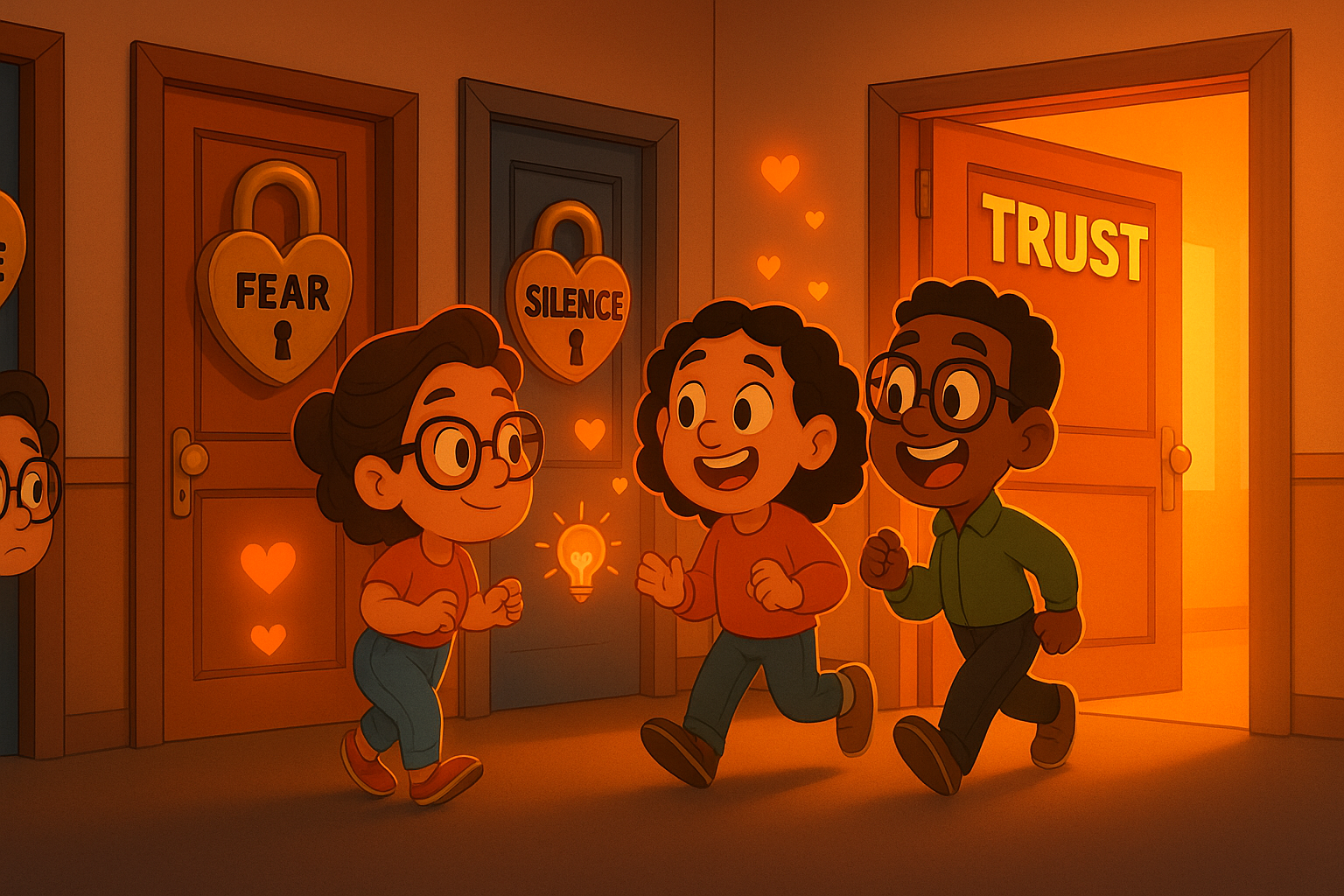Trust Isn't a Perk—It's the Platform
Trust isn’t just a nice-to-have in tech teams—it’s the foundation that holds everything together. When people feel safe to speak up, problems surface early, creativity thrives, and real collaboration happens. But when trust breaks down, the cost goes far beyond missed deadlines.

A few years back, I was part of a team building a customer portal that was supposed to launch in six weeks. Three weeks in, one of our mid-level developers started raising concerns about the authentication flow during standup. "I think there might be edge cases we haven't considered," she'd say, or "What happens if users have multiple accounts?"
Each time, our tech lead would nod and say we'd "circle back on that" or "add it to the backlog." The developer's concerns got more specific over the next week, but the responses stayed the same. Eventually, she stopped bringing them up.
Two days before launch, we discovered a critical security vulnerability in exactly the authentication flow she'd been worried about. We had to delay the launch by three weeks and completely rebuild that component. The cost wasn't just the delay—it was the lost trust and the knowledge that we'd trained someone to stop speaking up when they saw problems.
That episode made it obvious that teams start to fail when people stop talking to each other honestly. When trust fades, information flow breaks down, problems go underground, and your best people start updating their resumes.
The Missing Foundation for Everything Else
In previous conversations here, we've explored how leaders need to provide direction and purpose, and why stepping back from hands-on work creates space for teams to grow. But there's a foundational element that makes both of those possible: that key element is trust.
Without trust, purposeful leadership becomes empty directives. Without trust, stepping back from day-to-day work just feels like abandonment. Trust is what transforms leadership from management into genuine guidance.
Trust as an Antidote to Entropy
Trust doesn't just enable better leadership—it actively fights against the natural decay that affects all teams over time. When people aren't afraid to say "hey, this process is broken" or "we keep having the same miscommunication," you catch problems while they're still fixable instead of waiting until they blow up. When team members trust that their concerns will be heard, they don't retreat into silence as systems start to break down.
Remember that authentication issue from my story? That's entropy in action—a small communication problem that grew into a major failure because trust had already eroded. The developer had valuable insights, but the environment didn't support sharing them. Trust is what keeps teams vigilant against their own decline.
The Real Cost of Trust Breakdown
Research on high-performing teams consistently shows that psychological safety—the foundation of trust—is the single most important factor in team performance. Teams with high psychological safety are significantly more likely to report that their teammates don't make careless mistakes and experience lower turnover.
But you don't need research data to see this in action. Think about the last time someone on your team discovered a critical bug or identified a flawed assumption. Did they speak up immediately, or did they wait? Did they feel comfortable saying "I think we're going in the wrong direction," or did they keep quiet and hope someone else would notice?
The difference between those two scenarios isn't personality—it's trust.
The Trust-Building Framework: Small Actions, Big Impact
Trust isn't something you announce in a kickoff meeting or establish through team-building exercises. It's built through consistent, everyday actions that signal safety and reliability:
Listen with Intent Not just hearing words, but actually considering perspectives. When someone shares a concern, resist the urge to immediately solve or dismiss it. Ask follow-up questions. Repeat back what you heard to confirm understanding. This simple practice transforms how people perceive their voice in the team.
Own Your Mistakes First Nothing builds psychological safety faster than a leader saying "I screwed up." When I accidentally deployed a breaking change to production last year, I could have blamed unclear documentation or rushed timelines. Instead, I sent a team-wide message taking full responsibility. Within hours, two junior developers came forward with their own mistakes they'd been hiding, and we fixed three potential issues before they hit users.
Follow Through on Everything Whether it's fixing a small bug, giving promised feedback, or addressing a process concern someone raised—do what you say you'll do. This connects directly to the purposeful leadership we discussed earlier: when your actions consistently align with your stated direction, people learn they can count on both your word and your judgment. Trust lives in the gap between promise and delivery. Close that gap consistently, and people start believing their input actually matters.
Creating Space for Psychological Safety
Beyond individual actions, teams need systematic approaches to maintain open communication:
Establish Discussion Rituals One of the most effective teams I worked with had developed a healthy habit: anyone could pause any meeting with the phrase "Can we slow down?" When this happened—maybe once every few weeks—the entire group would stop, take a breath, and make sure everyone was aligned before moving forward.
These moments often caught issues that would have otherwise slipped through—missing dependencies, overlooked edge cases, or assumptions that hadn't been properly validated. A simple pause frequently saved the team from much larger problems down the road.
Normalize Not Knowing Make it explicitly okay to say "I don't understand" or "I need help with this." In code reviews, celebrate questions as much as solutions. When someone admits uncertainty, respond with curiosity, not judgment.
Invite Challenge The best ideas often come from those who see things differently. Create explicit moments for people to challenge assumptions, question approaches, or suggest alternatives. Frame these as valuable contributions, not roadblocks.
Where Does Your Team Stand?
Before building trust, it helps to understand where you're starting from. Take an honest look at your team dynamics:
- Do people bring up concerns early, or only after things go sideways?
- When someone makes a mistake, is the first response blame or curiosity?
- Are new ideas genuinely welcomed, or do they get politely acknowledged and quietly ignored?
- Would a junior team member feel comfortable disagreeing with a senior developer in a public meeting?
Your answers to these questions will show you which areas need the most attention.
Building Trust Starting Tomorrow
You don't need to overhaul your entire culture overnight. Start with one simple practice:
When someone comes to you with a problem or admits they messed something up, fight the instinct to jump straight into fix-it mode. Instead, ask them something like "What's your take on what happened?" or "How are you thinking about this?" Show them you're actually curious about their perspective, not just looking for the fastest solution.
That's it. Do this consistently and watch how it changes the conversation in your team.
The Platform Effect
Trust isn't just a nice-to-have team attribute—it's the foundation that everything else is built on. When people feel safe to speak honestly, problems surface early instead of late. Creative solutions emerge because people aren't afraid to suggest "crazy" ideas. Team velocity increases because less time is spent on politics and more on actual work.
Teams with high trust don't just ship better software—they enjoy building it more. And in an industry where talent retention is critical, that's not just a cultural win. It's a business advantage.
The developer from our authentication story was right to raise those concerns. We just hadn't built the environment necessary to hear her. The real tragedy wasn't the three-week delay—it was teaching someone that speaking up didn't matter.
Don't let that be your team's story.
